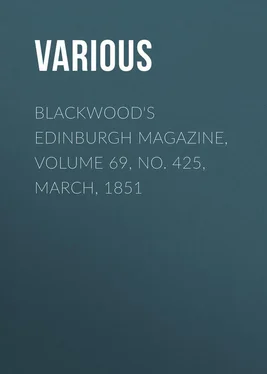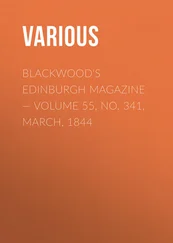Various - Blackwood's Edinburgh Magazine, Volume 69, No. 425, March, 1851
Здесь есть возможность читать онлайн «Various - Blackwood's Edinburgh Magazine, Volume 69, No. 425, March, 1851» — ознакомительный отрывок электронной книги совершенно бесплатно, а после прочтения отрывка купить полную версию. В некоторых случаях можно слушать аудио, скачать через торрент в формате fb2 и присутствует краткое содержание. Издательство: Иностранный паблик, Жанр: periodic, foreign_edu, Путешествия и география, на английском языке. Описание произведения, (предисловие) а так же отзывы посетителей доступны на портале библиотеки ЛибКат.
- Название:Blackwood's Edinburgh Magazine, Volume 69, No. 425, March, 1851
- Автор:
- Издательство:Иностранный паблик
- Жанр:
- Год:неизвестен
- ISBN:нет данных
- Рейтинг книги:3 / 5. Голосов: 1
-
Избранное:Добавить в избранное
- Отзывы:
-
Ваша оценка:
- 60
- 1
- 2
- 3
- 4
- 5
Blackwood's Edinburgh Magazine, Volume 69, No. 425, March, 1851: краткое содержание, описание и аннотация
Предлагаем к чтению аннотацию, описание, краткое содержание или предисловие (зависит от того, что написал сам автор книги «Blackwood's Edinburgh Magazine, Volume 69, No. 425, March, 1851»). Если вы не нашли необходимую информацию о книге — напишите в комментариях, мы постараемся отыскать её.
Blackwood's Edinburgh Magazine, Volume 69, No. 425, March, 1851 — читать онлайн ознакомительный отрывок
Ниже представлен текст книги, разбитый по страницам. Система сохранения места последней прочитанной страницы, позволяет с удобством читать онлайн бесплатно книгу «Blackwood's Edinburgh Magazine, Volume 69, No. 425, March, 1851», без необходимости каждый раз заново искать на чём Вы остановились. Поставьте закладку, и сможете в любой момент перейти на страницу, на которой закончили чтение.
Интервал:
Закладка:
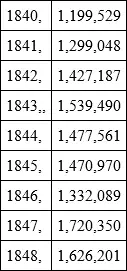
– Progress of the Nation , 3d Ed. p. 94.
These are the results exhibited in England and Wales. The poor's rates since 1837 have doubled in real weight, and we need not say that they are calculated to awaken the most alarming reflections; the more especially when it is recollected that the year 1849 was one of reviving, and, during its last six months, of boasted commercial prosperity. But the matter becomes much more serious, and the picture of the social condition of the island much more correct and striking, when the simultaneous measures, adopted during the last five years in Scotland and Ireland, are taken into consideration.
We need not tell our readers that, prior to 1844, Ireland had no poor law at all; and that although Scotland had a most humane and admirable poor law on its statute-book, yet its operation had been so much frittered away and nullified, by the unhappy decision of the Court of Session, which gave no control to the local courts over the decisions of the heritors and kirk-sessions (church-wardens of parishes), thereby in effect rendering them judges without control in their own cause, that it, practically speaking, amounted to almost nothing. But as the evils of that state of things had become apparent, and had been demonstrated luce meridianâ clarius , by Dr Alison and other distinguished philanthropists, an efficient statute was passed in 1845, which corrected this evil, and has since produced the following results, which may well attract the notice of the most inconsiderate, from the rapid increase which pauperism exhibits, and the extraordinary magnitude it has already attained in Scotland —
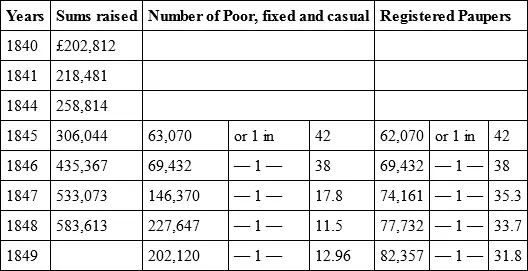
– Poor-Law Report, Scotland , Aug. 1849.
In the year 1850, a year of unusual commercial prosperity, the sums assessed for the relief of the poor in Glasgow alone, irrespective of buildings and other expenses connected with them, was £87,637, and with these expenses £121,000. 7 7 Dr Young's Report , Jan. 1851
In Ireland, the growth of the Poor Law, from its first introduction, has been still more rapid and alarming, as might have been anticipated from the greater mass of indigence and destitution with which it there had to contend. The sums raised for relief of the poor in that country, the nominal rental of which is £13,000,000, has stood thus for the last three years —
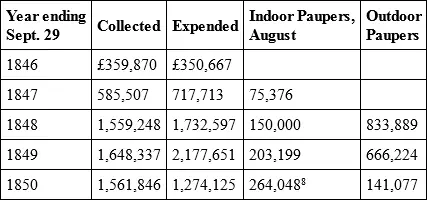
– Third Annual Report, Ireland , p. 7.
8 On 22d June, 1850.
On 3d July 1847, no less than 3,020,712 persons were fed by the public in Ireland , being about 40 per cent on the whole population – certainly, at that date, under 8,000,000. Well may the Edinburgh Review say, in reference to this astonishing subject —
"The collection in the year 1847-8 is remarkable: three times the amount of the collections of 1846-7, five times the amount of the collections of 1845-6. A tax unknown in Ireland ten years before was levied in the Year 1848 to the extent of one-ninth of the rateable property of the country, and that in a period of unprecedented depression and embarrassment. In the same year the expenditure had risen 150 per cent above that of 1847, and 500 per cent above the expenditure of 1846 . The expenditure in 1848-9 exceeds that of 1847 by the large sum of £445,054." 9 9 Edinburgh Review , Jan. 1851.
The diminished expenditure of 1850 is mainly owing to the reduction in the price of provisions in that year, which has caused the cost of an in-door pauper to decline from 2s. 2d., which it was in April 1847, to 1s. 2d., or nearly a half , to which it fell in autumn 1849, which it has never since exceeded. Measured by quarters of grain, the poor's-rate of Ireland, in 1850, was fully twice as heavy as it was in 1848, when the effects of the disastrous famine of 1846 were still felt.
After these broad and decisive facts, drawn from so many official sources, and all conspiring to one result, it may seem unnecessary to go further, or load these pages, for which matter abundant to overflowing still remains, with any farther proof or illustration of a thing unhappily too apparent. But as our present system is mainly calculated for the interests of our great manufacturing cities, and, at all events, has been brought about by their influence, and is strictly in conformity with their demands, we cannot resist the insertion of an extract from an eloquent speech of a most able, humane, and zealous minister of the Free Church in Glasgow on the moral and religious state of the working-classes in that vast and rapidly-increasing city, which now has little short of 400,000 inhabitants within its bounds.
"I know," said Dr Paterson, "that many congregations, not of the Free Church, both feel and manifest an anxious and enlightened concern in this cause. I do not attempt to describe their efforts, simply because I am not in a position to do them justice. I hail them, however, as fellow-labourers. I rejoice to know that they are in the field to some extent already, and I shall rejoice still more to see their exertions multiplying side by side with our own. Certain I am that nothing short of a levy en masse of whatever there is of living Christianity in the city , in all the branches of the Church of Christ which it contains, will suffice to make head against the augmenting ignorance and ungodliness, and Popery and infidelity, with which we have to deal . My other observation is for the members of our own church. Some of them will, perhaps, be startled by this movement, simply because it in adding another to our already numerous schemes – and because it may aggravate the difficulty we already feel of carrying them on. Here, they may say, is the beginning of new demands upon both our money and our time. To such a complaint I have no other answer to make but one – but it is one that seems to me to be decisive. My answer is, that this movement, whatever it may cost, is a matter of life and death. If we do not destroy this evil, it will destroy us ."
These are certainly strong expressions, but they come from one well acquainted, from personal visitation in his parish, which is one of the most densely peopled in Glasgow, and second to none in zeal and ability to combat the enormous mass of destitution, crime, sensuality, and civilised heathenism with which he has to deal. And that he does not exaggerate the evil, and speaks from accurate information, not vague imagination, is evident from the details which he gives.
"I begin with the Old Wynd, which is the western boundary of the parish, and of which only the one side, therefore, is in the Tron parish. That one side contains 102 families and 504 individuals. Among that population there are possessed in all only 11 church sittings, or little more than 2 to the 100. Of the 102 families, only 14 profess to be in the habit of going to any place of worship. In the New Wynd, there are 350 families and 1976 individuals, possessing in all 66 church sittings, or little more than 3 to the 100. Of the 350 families, only 67 profess to be in the habit of attending any place of worship. Lastly, the Back Wynd contains 137 families and 752 individuals, who possess in all only 6 church sittings, or less than 1 to the 100! Of these 137 families, only 13 profess to attend any place of worship. Here, then, in these three Wynds, constituting but a section of the parish, we have a population of 3232 individuals, with only 83 church sittings, or little more than an average of 2½ to the 100. Of the 589 families of which that population consists, the enormous number of 495 families, by their own confession, are living in habitual and total estrangement from the house of God . In these appalling circumstances, it will not surprise the presbytery to learn, that in the whole of the three Wynds there were found no more than 117 Bibles – in other words, that scarcely one family in five were possessed of a copy of the Word of God."
Читать дальшеИнтервал:
Закладка:
Похожие книги на «Blackwood's Edinburgh Magazine, Volume 69, No. 425, March, 1851»
Представляем Вашему вниманию похожие книги на «Blackwood's Edinburgh Magazine, Volume 69, No. 425, March, 1851» списком для выбора. Мы отобрали схожую по названию и смыслу литературу в надежде предоставить читателям больше вариантов отыскать новые, интересные, ещё непрочитанные произведения.
Обсуждение, отзывы о книге «Blackwood's Edinburgh Magazine, Volume 69, No. 425, March, 1851» и просто собственные мнения читателей. Оставьте ваши комментарии, напишите, что Вы думаете о произведении, его смысле или главных героях. Укажите что конкретно понравилось, а что нет, и почему Вы так считаете.
